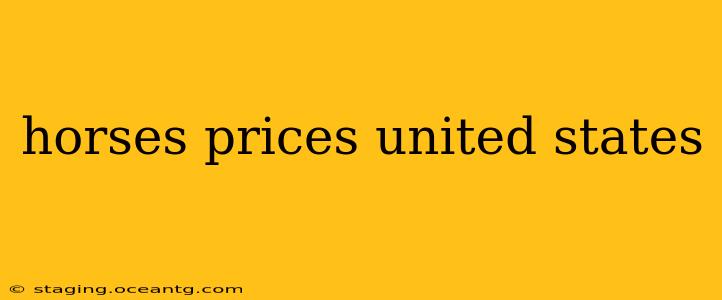The price of a horse in the United States can vary wildly, influenced by numerous factors. This comprehensive guide will explore the different price ranges, factors affecting cost, and resources to help you find the perfect equine companion. Understanding these factors is crucial whether you're a seasoned equestrian or a first-time buyer.
What Factors Determine Horse Prices in the US?
Several key factors significantly impact a horse's price tag:
-
Breed: Thoroughbreds, known for their racing pedigree, often command the highest prices. Other breeds like Quarter Horses, Arabians, and Morgans also have varying price points based on lineage, bloodlines, and show record. Less-established breeds or mixed breeds generally fall into lower price brackets.
-
Age: Young horses (weanlings, yearlings) are typically less expensive than mature, trained horses. However, the potential for growth and training in young horses can be a considerable investment. Older horses, depending on their health and training, may be more affordable.
-
Training and Discipline: A horse trained in a specific discipline (e.g., dressage, jumping, barrel racing) will typically cost more than an untrained horse. The level of training and the horse's performance record directly impact its value.
-
Conformation and Health: A horse's physical structure (conformation) plays a vital role in determining its price. Soundness and health are paramount; horses with pre-existing conditions or health concerns will generally be priced lower. Veterinary records are essential in assessing a horse's value.
-
Location: Geographic location can impact prices. Horses in areas with high demand or a strong equestrian community may fetch higher prices. Similarly, areas with a surplus of horses might offer more affordable options.
-
Seller: Private sellers often offer more competitive prices than established breeders or dealers, although thorough due diligence is crucial when buying from private sellers.
What is the Average Price of a Horse in the US?
There's no single "average" price for a horse in the United States. The cost can range from a few hundred dollars for an older, less-trained horse to hundreds of thousands for exceptional show horses or proven breeding stock. However, a reasonable starting point for a sound, rideable horse might fall within the $2,000 to $10,000 range, but this is a broad estimate and can significantly vary depending on the factors mentioned above.
Where Can I Find Horses for Sale in the US?
Numerous avenues exist for finding horses for sale in the US:
-
Online Marketplaces: Websites specializing in equine sales (like Equine.com, DreamHorse.com, etc.) list horses for sale across the country. These often provide detailed descriptions, photos, and videos.
-
Local Equestrian Communities: Networking within your local equestrian community can lead to hidden gems and opportunities not widely advertised online.
-
Breed-Specific Organizations: Many breed associations maintain registries and may have resources or links to horses for sale.
-
Auction Sales: Livestock auctions can provide opportunities to find horses at potentially lower prices, though careful inspection is essential.
What are the Additional Costs of Owning a Horse?
Beyond the initial purchase price, owning a horse involves significant ongoing costs:
-
Boarding: The cost of boarding can vary significantly depending on location, facilities, and level of care. This is often the largest ongoing expense.
-
Veterinary Care: Routine checkups, vaccinations, and unexpected veterinary bills can quickly add up.
-
Farrier Services: Regular hoof care is crucial for a horse's health and well-being.
-
Feed and Supplements: The cost of feed will vary depending on the horse's dietary needs and the quality of feed used.
-
Equipment: Saddles, bridles, halters, and other equipment are necessary and can represent a substantial initial investment.
How Much Does it Cost to Buy a Show Horse in the US?
Show horses, especially those with proven records and high-level training, can command prices ranging from tens of thousands to hundreds of thousands of dollars. The price is directly correlated with the horse's accomplishments, pedigree, and the potential for future winnings.
What is the Cheapest Way to Buy a Horse in the US?
The cheapest way to acquire a horse often involves purchasing an older horse needing retraining or rehabilitation, or a less-desirable breed with some minor health or soundness issues. However, it's vital to be realistic about the potential costs involved in training, rehabilitating, or addressing health concerns. Always prioritize a thorough veterinary examination.
This guide provides a comprehensive overview of horse prices in the US. Remember to always conduct thorough research and due diligence before making a purchase. Finding the right horse is a significant investment, both financially and emotionally.
